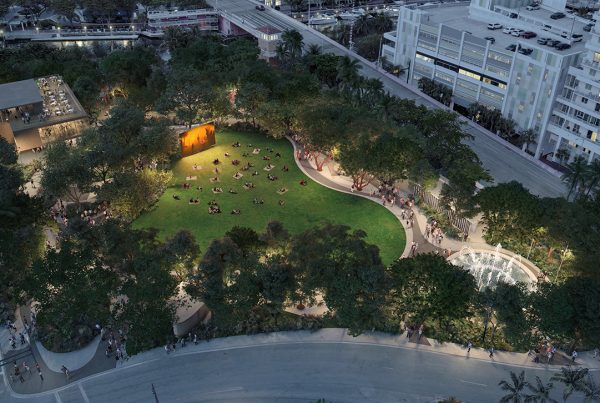Delray Beach’s next city manager will become CEO of a community that is going through a second transformational stage of development.
Residents who recall the downtown revival that began three decades ago may find this next phase exhilarating or intimidating. But there’s no denying that it’s happening and that the effect will spread beyond downtown.
Consider:

- Three downtown hotels soon will open. The 122-room Aloft (Samar Hospitality) and a 150-room Courtyard by Marriott (Kolter Real Estate) are under construction in the growing South of Atlantic (SOFA) neighborhood. Menin Development has obtained permits for The Ray, which will bring 141 rooms to Pineapple Grove. The Aloft includes 35 condominiums whose owners will have privileges at the hotel.

- Menin also will develop Delray City Market, a 150,000-square foot, mixed-use project on roughly one acre at Southeast First Street and Southeast Third Avenue. Menin will devote roughly 40 percent of the space to what the company calls “Florida’s largest food court,” with accompanying restaurants and a brewery. That project is going through permit review.

- Fourth and Fifth Delray—aka the IPIC—just opened. By bringing the company’s headquarters and additional office space, the project adds new elements to Delray Beach’s downtown/drinking scene.
- Excavation has begun of the first underground garage for Atlantic Crossing. It will be on the western block—between Northeast Sixth Avenue Seventh Avenue. The developer expects that the first offices and stores will open by the end of the year and that the first apartments will open next spring.

- At year’s end, the city commission approved plans for redevelopment of the former Office Depot headquarters on Congress Avenue. That mixed-used project could bring roughly 1,000 apartments along with retail and office space. The site is just south of Atlantic Avenue. Just to the north is the Delray Station rental complex. A new neighborhood west of Interstate 95 is emerging.
- By November 2020, the developers of Frog Alley hope to have all approvals for their project next to the Fairfield Inn on West Atlantic Avenue. The city hopes that Frog Alley will catalyze redevelopment of the older northwest/southwest neighborhoods around the area.
- Finally, there’s the Midtown project for the historic area along Swinton Avenue near Atlantic. As The Palm Beach Post reported, Midtown is stalled because of lawsuits among the principals.
City Commissioner Bill Bathurst said, “I have to think that it is a rather unique situation to see all these projects happening at the same time in such a small area. It will change the footprint of Delray.”
Bathurst added, “Whether one agrees with or ‘likes’ the growth downtown. I am hoping that the addition of residences and office will help to even out our economy and that we will move from being mostly an entertainment district to being a stable, walkable community with varied economic drivers.”
City Commissioner Ryan Boylston compared the new wave to a series of projects that went through in the mid-2000s, before the recession. He cited Worthing Place and developments in Pineapple Grove.
This wave “adds up to lot,” Boylston said, “but it’s all to scale and done very much in the Delray Beach style.”
Atlantic Crossing, Boylston said, “excites me the most. It’s next to Veterans Park. Part of it will be on Federal Highway, not just Atlantic. You won’t see the (parking) garage. These are quality projects with a sense of place.”
Still, some aspects will be new. The commission allowed a design for The Ray that differs from almost everything else in Delray Beach. The idea was to embrace and highlight the funkiness of Pineapple Grove, the arts district. IPic also broke new architectural ground. SOFA will retain a style different from other neighborhoods.
Thirty years ago, Delray Beach’s turnaround began with public and non-profit projects—Old School Square, the tennis center, the south county courthouse. Now that private investment is gushing into the city, Bathurst and Boylston believe that government must do its part.
With the new development, Bathurst said, must come “better parking and parking management.” On Monday, Boylston reiterated his wish for a bond issue that would finance upgrades to every park in the city and finance the $20 million master plan for Pompey Park.
Then there’s the nearly $400 million cost of fortifying Delray Beach against rising seas. Nothing about Delray Beach will be dull anytime soon.
Deerfield curtailing dispensaries?

With Boca Raton preparing an ordinance that would permit medical marijuana dispensaries, city officials might want to monitor events in Deerfield Beach.
In January 2018, the city commission voted to allow the dispensaries under rules set by the Florida Legislature following voter approval of medical marijuana in November 2016. Several have opened.
This ordinance, however, would ban new dispensaries. Current ones could continue. Deerfield Beach’s website provided no information about why the city may reconsider. Calls to the mayor, the city attorney and the planning and development director were not returned.
If the commission goes along tonight, a second public hearing would be on the May 21 agenda.
The last straw in Delray

Delray Beach passed its plastic-straw ban just in time.
As expected, the Legislature—which ended its annual session on Saturday—imposed a five-year moratorium on new city or county restrictions on single-use plastic straws. The Legislature previously had preempted local governments from banning plastic bags.
Supposedly, the moratorium will allow time to study the issue. In fact, Tallahassee listened to lobbyists for the Florida Retail Federation and Associated Industries of Florida. Some of their members oppose the ban. The science is clear that too much plastic winds up in our oceans. That would seem important to a state like Florida, but lobbyists run Tallahassee.
The Boca Raton City Council chose to encourage a shift in consumer sentiment, not to ban the straws. Similarly, Delray Beach worked with restaurants to get as much voluntary compliance as possible. But the ban will take effect in about 18 months. At least Tallahassee didn’t make the preemption retroactive.
The Airbnb issue
Cities and counties did catch a break with the failure this year to pass more restrictions on local control of vacation rentals.
Neither Boca Raton nor Delray Beach has imposed any laws, but popular destinations in Florida often deal with the problem of owners in single-family neighborhoods renting homes to people who act as if every night is spring break. The same abuse can happen in condo towers. South Beach has responded especially strongly.
Lobbyists for Airbnb, HomeAway and other rental brokers have pushed back against the regulations. As noted in the previous item, they have more clout in Tallahassee than homeowner associations. Supportive legislators claim to be protecting property rights. Of absentee owners? And what about the rights of neighbors to enjoy their property?
The Legislature first placed vacation rentals under statewide regulation in 2011. That bill allowed the 75 existing regulations to remain. This year’s legislation would have wiped out those earlier rules.
Revenue sharing with charter schools
Last week, I criticized state Rep. Mike Caruso for voting for legislation that could have cost the Palm Beach County School District $88 million over four years. The bill required school districts to share revenue from new sales tax surcharges with charter schools.
Caruso emailed to say that while he did vote for the bill, which included a statewide sales tax holiday for school supplies, he also supported an amendment to apply the rule only to future referendums. The amendment failed. Caruso said he voted for House Bill 7123 because it contained “so many good provisions.” Caruso cited a reduction in the tax on leases of commercial property and a tax break for hardening homes against hurricanes.
Fortunately, the Florida Senate refused to go along with the provision that gave charter schools a share of the money. About 20 counties passed similar sales tax increases to help public education, but only Palm Beach County’s ballot specified that the money would go only to traditional public schools. Caruso agreed that “Palm Beach County residents were very clear with their vote.”
Because of the Senate’s resistance, the requirement to share money with charter schools will apply only to future votes. Caruso voted for the amended bill.
Visit Florida gets a reprieve

Visit Florida, the state’s tourism marketing agency, has survived for now, also because of a compromise.
The House wanted to kill Visit Florida. The Senate didn’t. Neither did Gov. Ron DeSantis.
So the legislation retains the agency, but for only a year. And Visit Florida got $50 million in the state budget. DeSantis had wanted $76 million.
Elected officials in Boca Raton, Delray Beach and elsewhere in Palm Beach County generally support Visit Florida’s marketing efforts that help local tourism. The agency has had problems that legislation could correct. Even under new leadership, however, the House remains fixated on killing Visit Florida. The fight will start up again next year.







